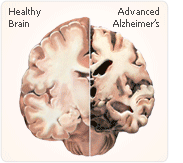
Alzheimer disease (AD) is the most prevalent form of dementia among older generations and is more common in women. Despite conflicting evidence, many reports suggest that hormone therapy could decrease the risk for or delay the onset of Alzheimer's in postmenopausal women.
This commentary reviews the neuroprotective and neurotrophic effects of estrogen, focusing on brain regions involved in learning and memory. It looks at evidence regarding the success of hormone therapy in preventing or delaying the beginning of Alzheimer's in postmenopausal women and it evaluates emerging research into the use of estrogen to treat this type of dementia.
Because Alzheimer's is most common in women, it could be deduced that low estrogen levels are linked to the decline in cognitive function associated with this form of dementia. Reduced estrogen levels following menopause and menopausal symptoms are a risk factor for Alzheimer's, and neurobiological studies have established a link between estrogen and learning and memory capabilities.
Most studies have found that hormone therapy has favorable effects on learning and memory in women that have experienced menopause and menopausal symptoms. Furthermore, hormone therapy is related to a reduced risk for Alzheimer's, though various investigations failed to report notable effects. Without large randomized studies it is difficult to determine the use of estrogen hormone therapy to prevent or defer Alzheimer's in postmenopausal women who have experienced menopausal symptoms. There is also uncertainty regarding the positive effects of estrogen hormone therapy on cognitive function occurring straight after menopause and menopausal symptoms or later in life, and whether estrogen is helpful in stopping the cognitive decline observed in normal aging or in pathological conditions.

It could be that estrogen is most effective in preventing Alzheimer's immediately or shortly after menopause and menopausal symptoms. Numerous observational studies have indicated a considerable reduced risk for the development of Alzheimer's among females that have used hormone therapy after menopause and menopausal symptoms. The Women's Health Initiative Study of Cognitive Aging, a randomized, placebo-controlled trial will evaluate cognitive outcomes with hormone therapy use, is likely to offer a great deal of evidence about the influence of estrogen-based hormone therapy on cognition and Alzheimer's in women who have experienced menopause and menopausal symptoms. This study is one of many large clinical studies that will provide vital data about the potential effects of hormone therapy on preserving cognitive function in women who have experienced menopause and menopausal symptoms.
Currently, most observational evidence, supported by neurobiological research findings on the role of estrogen, suggests that hormone therapy alleviates the degeneration that may cause Alzheimer's. The lack of evidence of estrogen's part in treating Alzheimer's indicates that hormone therapy should begin as early as possible after menopause and menopausal symptoms, before the onset or development of the disease. In conclusion, the relationship of hormone therapy after menopause and menopausal symptoms to Alzheimer's is somewhat similar to its relationship to osteoporosis in that hormone therapy appears to have a role in primary prevention.